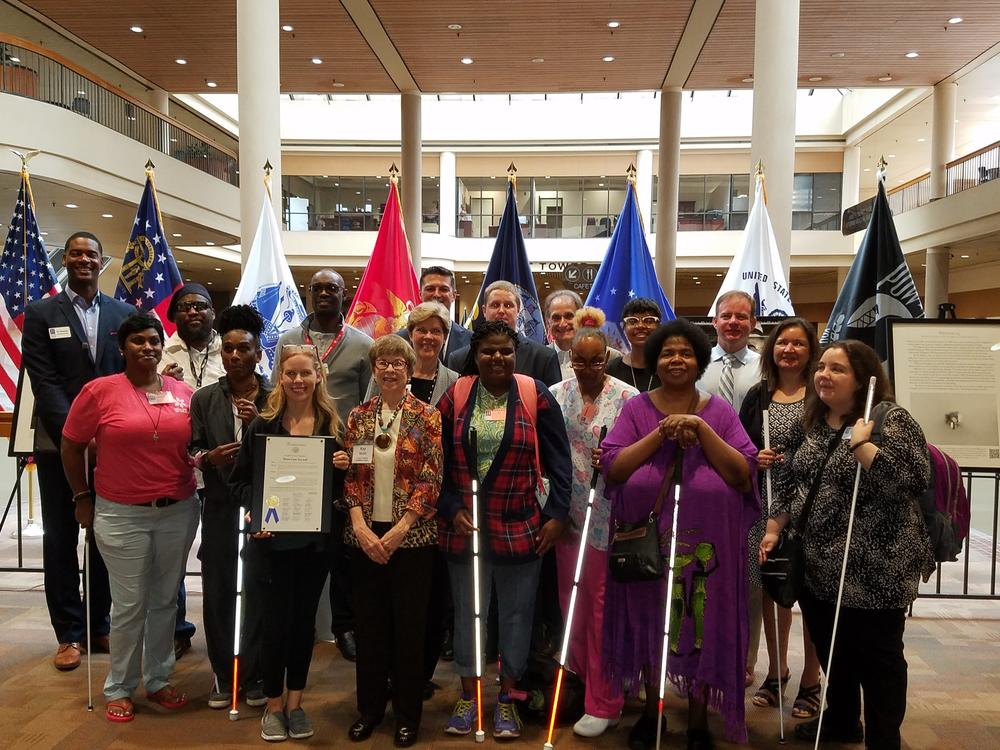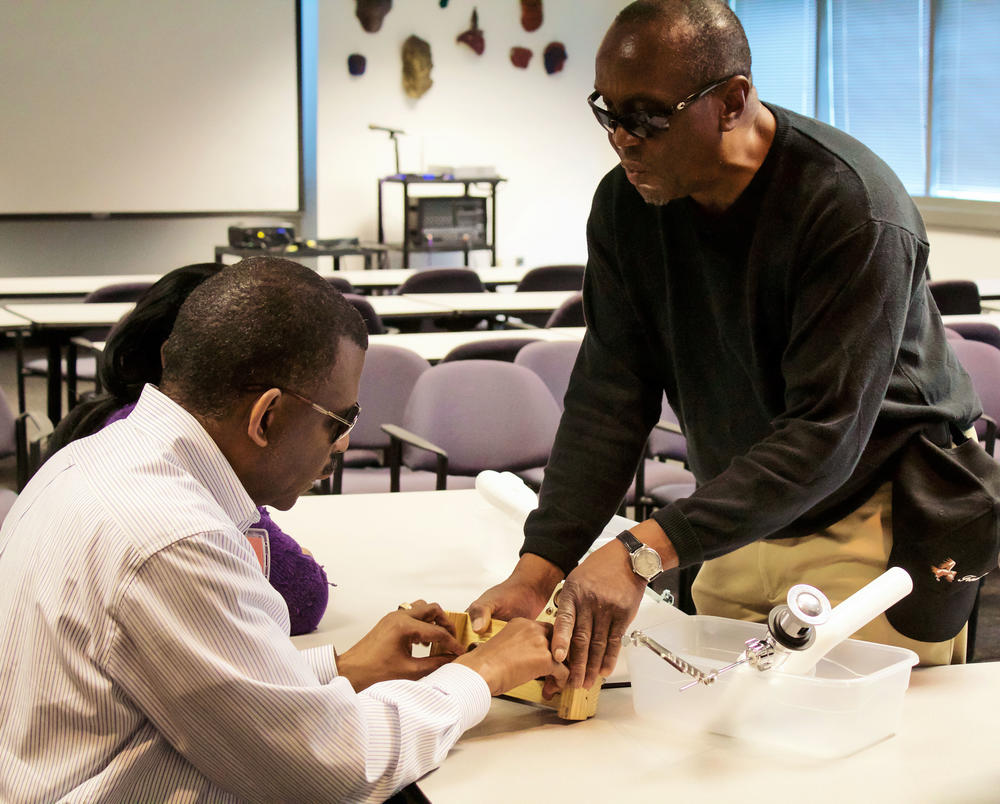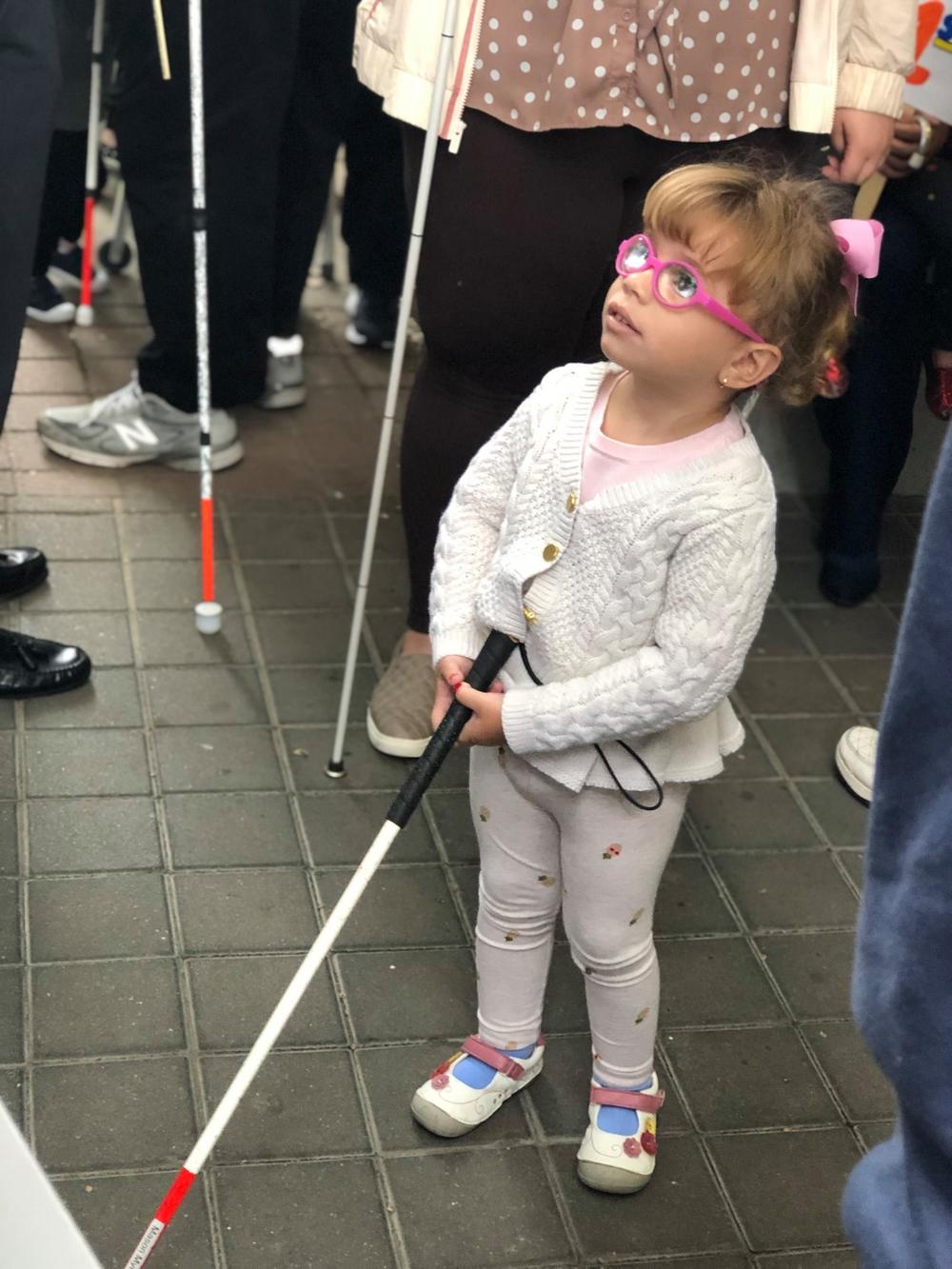Section Branding
Header Content
Living With Vision Loss During A Coronavirus Pandemic
Primary Content
Georgians were able to socialize in close quarters and not have to worry about constantly washing their hands or disinfecting surfaces only a few months ago. Now, as the coronavirus has spread across the state, people are settling into a life mostly indoors with modified ways to connect with others.
People with vision loss are adjusting to a new world with a lack of physical connection as Gov. Brian Kemp continues to encourage social distancing and quarantining at home.
Before the coronavirus pandemic, Atlanta’s Center for the Visually Impaired (CVI) was offering rehabilitation and educational classes for individuals and families with vision loss. The center held in-person meetings, operated a preschool in collaboration with Georgia Pines for blind schoolchildren and provided support to families.
Once coronavirus cases appeared in Georgia, the center shut its doors as soon as possible. Several of their programs, including their early intervention programs, went remote and group sessions carried on online.
CVI’s interim President Lisa Kennedy said virtual learning can be a different experience for those with vision loss.
“It is a different learning curve because [for] someone facing vision loss, it really depends on what their previous experience with technology was and how intensive the transition is for them,“ she said.
The center’s instructors offer iPhone training, for example, for people who use their iPhones as an assistant device or even special computer training for those who use their computers for different programs.
Kennedy said providing and continuing rehabilitation poses a challenge since going virtual. Clinic patients will work closely with CVI’s occupational therapist as best as possible remotely, and the therapist can even do online functional vision assessments.
“It's not an ideal situation — none of this is ideal — but we're able to stay in touch with people and continue to support them during a very difficult time,” Kennedy said.
Physical touch is crucial for visually impaired people to interact with the world. Reading Braille, getting a sense of their location and riding public transportation all require tactile experiences, but when the Centers for Disease Control and Prevention recommended people to disinfect surfaces frequently and wash hands regularly, people with vision loss had to get creative with limiting contact with surfaces.
George Acey, a group session leader and home repair instructor at CVI, recommends blind people to wear gloves — in addition to a face covering — to protect themselves when in public.
“It’s kind of scary for everybody, to tell you the truth, because you don’t know if they don’t touch anything, or if you’ll be around people who are coughing,” he said.
Acey lost his sight in December 1979 in a car accident that damaged the optic nerve in one eye and made him lose the other. At first, his vision loss was traumatic and a major blow to his confidence.
After getting rehabilitated at CVI in 1980, he realized he could still have a fulfilling life.
“Blindness doesn't mean the end of your life,” he said. “It just means you have to do things differently.”
While under quarantine, grocery shopping, for example, can no longer be done in the stores because social distancing would prohibit helpers to accompany blind people on their trips. Instead, they would ask a friend or loved one to pick up their groceries or, if they’re able, have them delivered to their door.
“For some people, that is a little more expensive than going to the store and [getting] it yourself because you have to pay for that delivery,” Acey said.
Maintaining at least 6 feet in distance with vision loss can also be challenging because blind people can’t see how close they are to someone. Instead, they rely on sound to gauge their spatial awareness and make adjustments to their environment.
Acey had to tell someone to step out of his personal space once when he was out in public.
“Sometimes, people may feel bad about telling someone that they’re too close, but you have to take that initiative,” he said. “It’s about staying alive.”
As weeks drawl on under quarantine, staying connected to others is more important than ever.
Acey hosts online group sessions and group phone calls once a week since Kemp mandated shelter-in-place orders. Clients check in on each other and make sure they’re being accommodated during the pandemic while lending an supportive ear and providing connection.
“[The group phone calls are] also just letting people know that someone’s out there thinking of them,” Acey said. “A lot of visually impaired people live by themselves.”
Kennedy said newly blind people are also going through large adjustments under quarantine.
“Isolation is hard for everyone and we're all adjusting to that, but if you're a person who's facing vision loss and you're early in your journey there, it's a very difficult period in your life,” Kennedy said. “And that support that we're able to provide and that sense of connection helps people remain optimistic and working toward their goals as much as possible during this period.”
Acey has been blind for over 30 years and knows how important it is to have unconditional support.
“We recommend that everybody have a contact person so you won't be out there alone,” he said.




